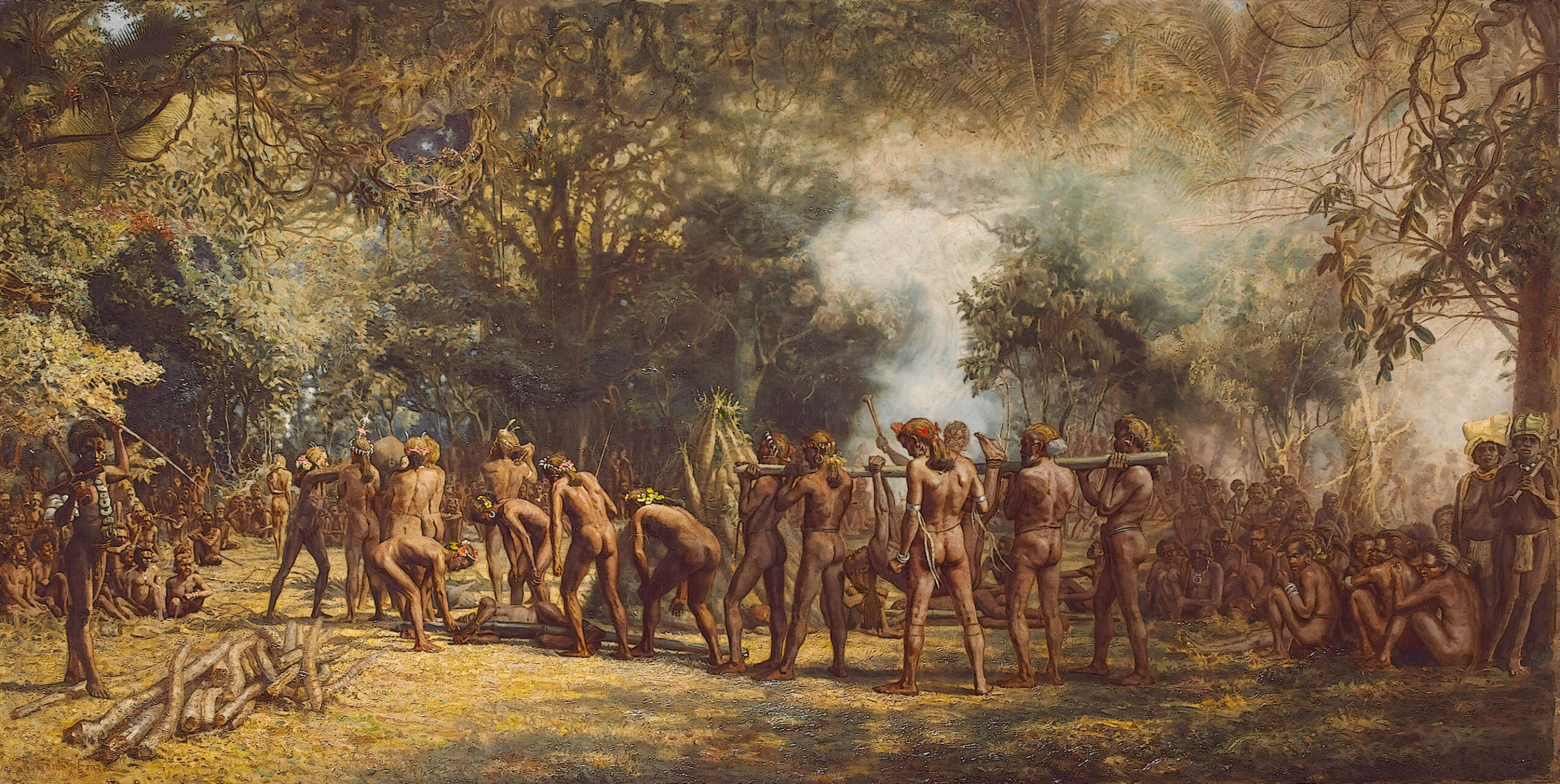Cannibalism, the act of consuming one’s own kind, specifically human flesh, also known as anthropophagy, has been a practice reported across diverse regions globally. It manifests in various contexts, such as cultural, religious, medicinal, and, at times, criminal. Despite societal progress into the 21st century, instances of cannibalism persist, revealing its complex and multifaceted nature.
Funeral cannibalism, observed among the Fore people of Papua New Guinea and the Wari of the Brazilian Amazon, involves consuming the deceased as a sign of love and respect. In the case of the Fore people, this practice aimed to prevent bodies from decomposing or being consumed by insects, with the belief that it protected the deceased from harmful spirits. The Wari incorporated cannibalism into their funeral rites until the influence of missionaries led to its discontinuation in the 1960s. Religious rituals have also historically involved cannibalism, such as the Aztecs reportedly consuming sacred corpses after human sacrifices to their gods.
Cannibalism has also been associated with revenge, dominance, and the acquisition of strength. Examples include Japanese soldiers in World War II consuming prisoners of war and the Korowai of New Guinea engaging in cannibalistic acts against suspected witches. Ugandan leader Idi Amin faced accusations of cannibalism, and the Carib of the Caribbean were falsely linked to cannibalism by Europeans as a justification for mistreatment.
Medicinal cannibalism spans global practices, from Chinese compounds incorporating human organs, nails, and hair to Ancient Greeks using human blood for epilepsy. Europeans, while condemning New World cannibals, resorted to consuming human body parts medicinally. Paracelsus followers, for instance, used powdered human skulls for dysentery, and 17th-century England employed pulverized mummies for ailments, sometimes specifying characteristics like using the remains of a redheaded man who died from hanging.
Cannibal cuisine, with flavors allegedly similar to veal or pork, has historical instances, such as the Batak of Sumatra selling human flesh in markets. In China during the Yuan dynasty, human-based dishes were considered a luxury, with mentions of “children’s meat” being prized as the best-tasting food. Some reported cases even describe children offering sections of their own thigh or upper arm in dishes as a gesture of respect for their elders.
Archaeological findings reveal signs of deliberate flesh removal from 600,000-year-old human bones in ancient cave dwellings. This practice also appeared in early Homo sapiens remains in Ethiopia. While the motivations behind these actions remain unclear, hypotheses point to factors such as food shortages and predator avoidance. By the Upper Palaeolithic period, cannibalism had evolved into a ritualistic practice, as evidenced in Gough’s Cave, where human skulls were used as drinking vessels. This transcendence marked the shift from survival-driven cannibalism to a sacred practice, a phenomenon that persisted into historical times, notably in ancient Egypt and among Druid clans in the early centuries CE.
Historical references from Greek and Roman writers highlighted cannibalistic tribes, while in Roman times, monks like the Aghoris in India practiced cannibalism as a means to transcend societal boundaries. Tibetan monks in the 1500s consumed “flesh pills” ritually, viewing them as tokens bridging the past Buddhas’ compassion and reminding eaters of the transient nature of their mortal flesh. However, it is observed that in religious, cultural, medicinal and funeral practices, cannibalism typically involves the consumption of already deceased individuals, as seen in funeral cannibalism. Conversely, in cases of crime, individuals resort to murder before engaging in cannibalism, as seen in reported cases from India.
In general, those practicing cannibalism for religious, cuisine, cultural, or funeral purposes typically do not kill for this purpose but consume the already deceased and some of them may me their relative. However, in cases of revenge cannibalism, consumption follows the act of murder. The question arises: when does cannibalism become a crime? Reported cases from India provide examples.
In 2022, Satish Chandra Rai from Assam was observed consuming human flesh after stealing parts of a corpse from a cremation ground.
In a horrifying 2022 incident in Kerala, a couple murdered two women in a ritualistic “human sacrifice”, with allegations that the accused consumed parts of the victims’ bodies.
In 2018, two individuals from Assam were apprehended in Manipur for confessing to the cannibalization of children.
In 2012, Mridul Kumar Bhattacharya and his wife, Rita Bhattacharya, were murdered in Assam, with the killers consuming their flesh.
In 2012, In the early 2000s, Raja Kolander, alias Ram Niranjan, who is famously known as the brain eater of India, went on a murderous rampage. In addition to taking lives, he would mutilate the bodies, and there are reports suggesting that, in certain instances, he would even go so far as to simmer the skulls and consume the brains.
Some of the cases reportedly involved human sacrifices as well like the Kerala case of 2022. Although we have laws addressing black magic and witchcraft in India aimed at preventing crimes associated with human sacrifices, as some of these reported cases, especially the Kerala case, were associated with human sacrifice, sections of the Indian Penal Code outline penalties for such occurrences.
While there is no comprehensive nationwide legislation specifically addressing superstitious practices, black magic, or human sacrifice, existing laws, such as Section 302 (dealing with murder) and Section 295A (pertaining to acts intended to outrage religious feelings), contribute to addressing aspects of cannibalistic crimes. Article 51A (h) of the Indian Constitution emphasizes the importance of promoting rational thinking and discouraging superstitious beliefs. Additionally, the Drugs and Magic Remedies Act of 1954 includes provisions aimed at addressing the detrimental impact of various superstitious activities prevalent in India.
In the case of Ishwari Lal Yadav v. State of Chhattisgarh in 2019, involving the human sacrifice of a two-year-old, a three-judge Supreme Court bench affirmed the death sentences for the married couple Kiran Bai and Ishwari Yadav. The court deemed this instance “the rarest of the rare,” warranting the death penalty, aligning with the precedent set in the Sushil Murmu v. State of Jharkhand in 2004, which also dealt with human sacrifice.
Considering cases like Satish Chandra Rai (2022), where individuals consume flesh from already deceased persons without committing murder, it may indicate a psychological disorder, possibly associated with necrophiliac cannibalism. In the 21st century, religious cannibalism, as practiced by groups like the Aghoris in India, is distinct from criminal acts, as it does not involve harming others or committing murder. It is crucial to differentiate between religious practices and criminal acts, with the latter being unacceptable both legally and socially. The observation made in study aligns with the idea that there is a need for a comprehensive legal framework to address incidents involving human sacrifices and cannibalism in India.
It suggests that either a new legislation specifically addressing these practices or amendments to existing legal provisions could enhance the legal response to such cases. The goal would be to ensure a more targeted and effective approach in dealing with these unique and disturbing criminal acts.
Dr. Pyali Chatterjee is HOD, Faculty of Law, ICFAI University, Raipur Chhattisgarh














